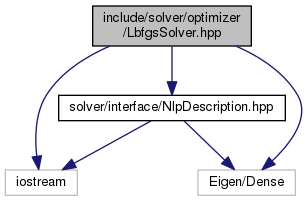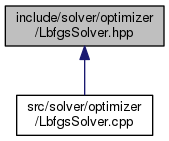|
solver
|
|
solver
|
C library of Limited memory BFGS (L-BFGS). More...


Go to the source code of this file.
Classes | |
| struct | solver::lbfgs_parameter_t |
| L-BFGS optimization parameters. More... | |
| class | solver::LbfgsSolver |
Typedefs | |
| typedef double(* | solver::lbfgs_evaluate_t) (void *instance, const double *x, double *g, const int n, const double step) |
| Callback interface to provide objective function and gradient evaluations. More... | |
| typedef int(* | solver::lbfgs_progress_t) (void *instance, const double *x, const double *g, const double fx, const double xnorm, const double gnorm, const double step, int n, int k, int ls) |
| Callback interface to receive the progress of the optimization process. More... | |
Functions | |
| int | solver::lbfgs (int n, double *x, double *ptr_fx, lbfgs_evaluate_t proc_evaluate, lbfgs_progress_t proc_progress, void *instance, lbfgs_parameter_t *param) |
| Start a L-BFGS optimization. More... | |
| void | solver::lbfgs_parameter_init (lbfgs_parameter_t *param) |
| Initialize L-BFGS parameters to the default values. More... | |
| double * | solver::lbfgs_malloc (int n) |
| Allocate an array for variables. More... | |
| void | solver::lbfgs_free (double *x) |
| Free an array of variables. More... | |
C library of Limited memory BFGS (L-BFGS).
Permission is hereby granted, free of charge, to any person obtaining a copy of this software and associated documentation files (the "Software"), to deal in the Software without restriction, including without limitation the rights to use, copy, modify, merge, publish, distribute, sublicense, and/or sell copies of the Software, and to permit persons to whom the Software is furnished to do so, subject to the following conditions:
The above copyright notice and this permission notice shall be included in all copies or substantial portions of the Software.
THE SOFTWARE IS PROVIDED "AS IS", WITHOUT WARRANTY OF ANY KIND, EXPRESS OR IMPLIED, INCLUDING BUT NOT LIMITED TO THE WARRANTIES OF MERCHANTABILITY, FITNESS FOR A PARTICULAR PURPOSE AND NONINFRINGEMENT. IN NO EVENT SHALL THE AUTHORS OR COPYRIGHT HOLDERS BE LIABLE FOR ANY CLAIM, DAMAGES OR OTHER LIABILITY, WHETHER IN AN ACTION OF CONTRACT, TORT OR OTHERWISE, ARISING FROM, OUT OF OR IN CONNECTION WITH THE SOFTWARE OR THE USE OR OTHER DEALINGS IN THE SOFTWARE.
| typedef double(* solver::lbfgs_evaluate_t) (void *instance, const double *x, double *g, const int n, const double step) |
Callback interface to provide objective function and gradient evaluations.
The lbfgs() function call this function to obtain the values of objective function and its gradients when needed. A client program must implement this function to evaluate the values of the objective function and its gradients, given current values of variables.
| instance | The user data sent for lbfgs() function by the client. |
| x | The current values of variables. |
| g | The gradient vector. The callback function must compute the gradient values for the current variables. |
| n | The number of variables. |
| step | The current step of the line search routine. |
| double | The value of the objective function for the current variables. |
| typedef int(* solver::lbfgs_progress_t) (void *instance, const double *x, const double *g, const double fx, const double xnorm, const double gnorm, const double step, int n, int k, int ls) |
Callback interface to receive the progress of the optimization process.
The lbfgs() function call this function for each iteration. Implementing this function, a client program can store or display the current progress of the optimization process.
| instance | The user data sent for lbfgs() function by the client. |
| x | The current values of variables. |
| g | The current gradient values of variables. |
| fx | The current value of the objective function. |
| xnorm | The Euclidean norm of the variables. |
| gnorm | The Euclidean norm of the gradients. |
| step | The line-search step used for this iteration. |
| n | The number of variables. |
| k | The iteration count. |
| ls | The number of evaluations called for this iteration. |
| int | Zero to continue the optimization process. Returning a non-zero value will cancel the optimization process. |
| anonymous enum |
Return values of lbfgs().
Roughly speaking, a negative value indicates an error.
| Enumerator | |
|---|---|
| LBFGS_SUCCESS |
L-BFGS reaches convergence. |
| LBFGS_ALREADY_MINIMIZED |
The initial variables already minimize the objective function. |
| LBFGSERR_UNKNOWNERROR |
Unknown error. |
| LBFGSERR_LOGICERROR |
Logic error. |
| LBFGSERR_OUTOFMEMORY |
Insufficient memory. |
| LBFGSERR_INVALID_N |
Invalid number of variables specified. |
| LBFGSERR_INVALID_EPSILON |
Invalid parameter lbfgs_parameter_t::epsilon specified. |
| LBFGSERR_INVALID_TESTPERIOD |
Invalid parameter lbfgs_parameter_t::past specified. |
| LBFGSERR_INVALID_DELTA |
Invalid parameter lbfgs_parameter_t::delta specified. |
| LBFGSERR_INVALID_LINESEARCH |
Invalid parameter lbfgs_parameter_t::linesearch specified. |
| LBFGSERR_INVALID_MINSTEP |
Invalid parameter lbfgs_parameter_t::max_step specified. |
| LBFGSERR_INVALID_MAXSTEP |
Invalid parameter lbfgs_parameter_t::max_step specified. |
| LBFGSERR_INVALID_FTOL |
Invalid parameter lbfgs_parameter_t::ftol specified. |
| LBFGSERR_INVALID_WOLFE |
Invalid parameter lbfgs_parameter_t::wolfe specified. |
| LBFGSERR_INVALID_GTOL |
Invalid parameter lbfgs_parameter_t::gtol specified. |
| LBFGSERR_INVALID_XTOL |
Invalid parameter lbfgs_parameter_t::xtol specified. |
| LBFGSERR_INVALID_MAXLINESEARCH |
Invalid parameter lbfgs_parameter_t::max_linesearch specified. |
| LBFGSERR_INVALID_ORTHANTWISE |
Invalid parameter lbfgs_parameter_t::orthantwise_c specified. |
| LBFGSERR_INVALID_ORTHANTWISE_START |
Invalid parameter lbfgs_parameter_t::orthantwise_start specified. |
| LBFGSERR_INVALID_ORTHANTWISE_END |
Invalid parameter lbfgs_parameter_t::orthantwise_end specified. |
| LBFGSERR_OUTOFINTERVAL |
The line-search step went out of the interval of uncertainty. |
| LBFGSERR_INCORRECT_TMINMAX |
A logic error occurred; alternatively, the interval of uncertainty became too small. |
| LBFGSERR_ROUNDING_ERROR |
A rounding error occurred; alternatively, no line-search step satisfies the sufficient decrease and curvature conditions. |
| LBFGSERR_MINIMUMSTEP |
The line-search step became smaller than lbfgs_parameter_t::min_step. |
| LBFGSERR_MAXIMUMSTEP |
The line-search step became larger than lbfgs_parameter_t::max_step. |
| LBFGSERR_MAXIMUMLINESEARCH |
The line-search routine reaches the maximum number of evaluations. |
| LBFGSERR_MAXIMUMITERATION |
The algorithm routine reaches the maximum number of iterations. |
| LBFGSERR_WIDTHTOOSMALL |
Relative width of the interval of uncertainty is at most lbfgs_parameter_t::xtol. |
| LBFGSERR_INVALIDPARAMETERS |
A logic error (negative line-search step) occurred. |
| LBFGSERR_INCREASEGRADIENT |
The current search direction increases the objective function value. |
| anonymous enum |
Line search algorithms.
| Enumerator | |
|---|---|
| LBFGS_LINESEARCH_DEFAULT |
The default algorithm (MoreThuente method). |
| LBFGS_LINESEARCH_MORETHUENTE |
MoreThuente method proposd by More and Thuente. |
| LBFGS_LINESEARCH_BACKTRACKING_ARMIJO |
Backtracking method with the Armijo condition. The backtracking method finds the step length such that it satisfies the sufficient decrease (Armijo) condition,
where x is the current point, d is the current search direction, and a is the step length. |
| LBFGS_LINESEARCH_BACKTRACKING |
The backtracking method with the defualt (regular Wolfe) condition. |
| LBFGS_LINESEARCH_BACKTRACKING_WOLFE |
Backtracking method with regular Wolfe condition. The backtracking method finds the step length such that it satisfies both the Armijo condition (LBFGS_LINESEARCH_BACKTRACKING_ARMIJO) and the curvature condition,
where x is the current point, d is the current search direction, and a is the step length. |
| LBFGS_LINESEARCH_BACKTRACKING_STRONG_WOLFE |
Backtracking method with strong Wolfe condition. The backtracking method finds the step length such that it satisfies both the Armijo condition (LBFGS_LINESEARCH_BACKTRACKING_ARMIJO) and the following condition,
where x is the current point, d is the current search direction, and a is the step length. |
| int solver::lbfgs | ( | int | n, |
| double * | x, | ||
| double * | ptr_fx, | ||
| lbfgs_evaluate_t | proc_evaluate, | ||
| lbfgs_progress_t | proc_progress, | ||
| void * | instance, | ||
| lbfgs_parameter_t * | param | ||
| ) |
Start a L-BFGS optimization.
| n | The number of variables. |
| x | The array of variables. A client program can set default values for the optimization and receive the optimization result through this array. This array must be allocated by ::lbfgs_malloc function for libLBFGS built with SSE/SSE2 optimization routine enabled. The library built without SSE/SSE2 optimization does not have such a requirement. |
| ptr_fx | The pointer to the variable that receives the final value of the objective function for the variables. This argument can be set to NULL if the final value of the objective function is unnecessary. |
| proc_evaluate | The callback function to provide function and gradient evaluations given a current values of variables. A client program must implement a callback function compatible with lbfgs_evaluate_t and pass the pointer to the callback function. |
| proc_progress | The callback function to receive the progress (the number of iterations, the current value of the objective function) of the minimization process. This argument can be set to NULL if a progress report is unnecessary. |
| instance | A user data for the client program. The callback functions will receive the value of this argument. |
| param | The pointer to a structure representing parameters for L-BFGS optimization. A client program can set this parameter to NULL to use the default parameters. Call lbfgs_parameter_init() function to fill a structure with the default values. |
| int | The status code. This function returns zero if the minimization process terminates without an error. A non-zero value indicates an error. |
| void solver::lbfgs_free | ( | double * | x | ) |
Free an array of variables.
| x | The array of variables allocated by ::lbfgs_malloc function. |
| double * solver::lbfgs_malloc | ( | int | n | ) |
Allocate an array for variables.
This function allocates an array of variables for the convenience of ::lbfgs function; the function has a requreiemt for a variable array when libLBFGS is built with SSE/SSE2 optimization routines. A user does not have to use this function for libLBFGS built without SSE/SSE2 optimization.
| n | The number of variables. |
| void solver::lbfgs_parameter_init | ( | lbfgs_parameter_t * | param | ) |
Initialize L-BFGS parameters to the default values.
Call this function to fill a parameter structure with the default values and overwrite parameter values if necessary.
| param | The pointer to the parameter structure. |